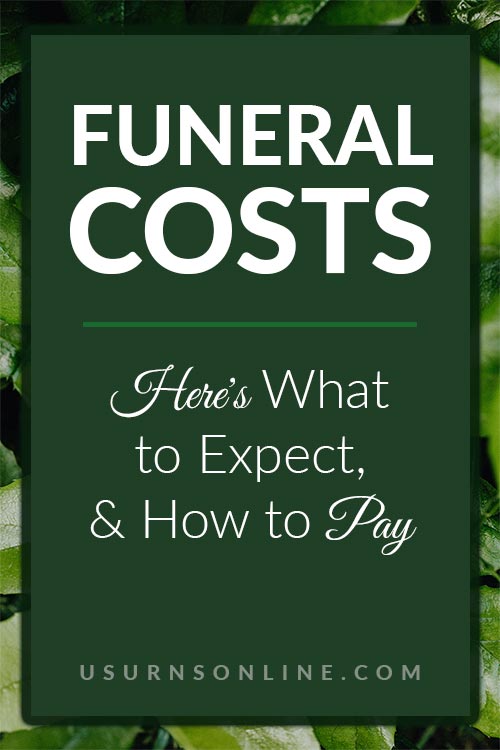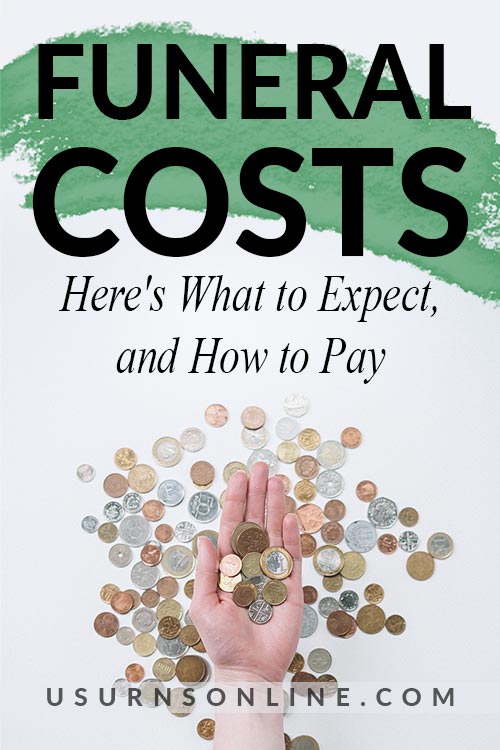Every year the cost of dying goes up. So the question is, how do you deal with the rising cost of a funeral? Now is the time to start thinking about your funeral before you “need” it.
Don’t wait until your time has come or your loved one has passed. Plan your funeral and plan for the funeral costs associated with it now. Doing so, you’ll get ahead of the inflation that is sure to come.
Read on to find out some helpful suggestions and insightful information on how to plan and pay for the funeral arrangements.
How Much Does a Funeral Cost?
This is the big question: How much should we expect to spend on a funeral?
Average Funeral Costs
The kind of burial you choose will have the most significant impact on the cost of the funeral.
The mean cost of a traditional funeral with a viewing and burial is approximately $7,640. But add a cemetery plot and a vault, and the prices can easily soar over $10,000.
Funeral Expenses
There are many expenses when it comes to a funeral. They will all be listed on the funeral home’s price list. The expenses will include:
- Basic service fee: This is a standard service fee that is associated with all funerals. This fee covers the cost of planning, including any permit and administrative fees. You’ll see this fee at around $2,000 to $2,5000.
- Service and merchandise fees: These cover things like transporting, preparing, and embalming the body, as well as funeral home fees for the viewing or memorial and any equipment or services required for the graveside interment. You will also need to pay for a casket or the necessary services needed for cremation or interment. Approximate prices for common line items:
- Hearse: $300 to $400
- Embalming: $500 to $700
- Casket: $2,000 to $10,000
- Cremation urn: $150 to $600
- Cash advances: There are some services that your funeral home may handle for you (and pay on your behalf); these can include flowers, clergy, and organists. You might have to pay an added service fee to account for the funeral home’s efforts. Still, per the FTC’s Funeral Rule, the funeral home must disclose all extra fees to you in writing.
Cremation Costs
The cost of cremation can be thousands of dollars less than a traditional burial. The typical funeral with cremation costs between $4,000 and $7,000 depending on the type of cremation and service options you have requested.
The most affordable (and most basic) option is direct cremation with no service, which costs on average about $2,000.00.
However, you may want or require additional products and services. This might include funeral home staff and service fees, casket rental for a viewing, a cremation urn, flowers, a hearse, embalming, funeral programs, and more.
Urns Made in the USA
It stands to reason the more additions you make to the cremation process, the more you will pay. You can make enough choices that it will drive the cost up to as much and more as a traditional service. The more you “DIY” the less you pay.
Traditional Burial Costs
The cost of a traditional burial will vary from cemetery to cemetery.
- The cost of the plot can be from $650 to $10,000.
- Some cemeteries require a burial vault – they cost from $700 to $13,000.
- All cemeteries charge for opening and closing the grave – this fee runs from $480 to $1,880.
- A headstone starts at $400 and can run into the thousands.
- And last but not least, the setting of the headstone. Starting prices range from $200 to $2,000, depending on the size of the monument and location of the cemetery.
As you consider your options, you’ll see why the price ranges are so broad.
An out-of-the-way plot in a country cemetery where the lawn is occasionally mowed will be towards the low end, while an historic cemetery in a big city with pristinely manicured grounds will be towards the high end. A simple flat marker is less expensive than a huge sculpted monument.
Related: The Funeral Process, Explained by a Funeral Director
What is the Cheapest Way to Have a Funeral?
A funeral home’s least expensive option is called a direct burial. With a direct burial, the body is buried soon after death, with no embalming or visitation.
Direct burials will only require the most basic expenses such as transportation, a basic container (e.g., casket), the costs of the cemetery plot and headstone, and the funeral home’s basic service fee.
Because there is no embalming, the burial (called a committal service) is done very soon after death.
Here are some ideas on how to save:
- 15 Ideas for a Beautiful Memorial Service on a Budget
- 50 Funeral Planning Tips for a Funeral on a Budget
How to Compare Funeral Costs
The most common way for you to compare funeral costs is to call the funeral home and ask what their fees are. Funeral homes are happy to discuss your needs with you. Then, the director will invite you to come in and consider all of your options.
The consumer is welcome to shop and compare prices before committing to any one funeral home.
Read more: How to Choose a (Great) Funeral Home
Funeral Payment Options
It’s wise to discuss payment options with your family members and also with the funeral director. Here are some of the most common ways to pay.
Cash (Savings)
If you are one of the lucky ones with a few thousand available in savings, this is the time to use it.
However, some funeral homes do not accept cash. So be prepared to bring a cashier’s check or money order to pay for the funeral.
Learn more: How to Start a Funeral Fund
Credit Card
A credit card is always accepted at funeral homes. Payment in full is the way funeral homes operate.
I have seen credit cards be denied at the funeral home, not because you don’t have the credit available, but because it is such a large purchase. If this happens to you, a simple phone call to your credit card company will solve the problem.
You can split the costs between credit cards.
Related: The 5 Best Ways to Plan Ahead for Funeral Expenses
Crowdfunding
Crowdfunding a funeral is raising money to pay for a loved one’s final expenses after they’ve died. You are soliciting funds from the public.
Typically, the crowdfunding web page is shared among friends and family members on social media, and it is often those closest to you who contribute. However, you may be surprised at the generosity of nearly-forgotten friends, distant relations, or complete strangers.
Ask Family
Asking your family for help can be hard. So ask for advice first, money second. Then, be honest about your situation and ask if there’s any way your family can help you.
Make a plan to repay the money you have borrowed.
Funeral Home Payment Plans
It is my experience that funeral homes do not take payment plans. Funeral homes have expenses that need to be met.
My analogy has always been, “You can’t go to the grocery store, walk out with a cart full of food and tell them you will pay them later.”
Prepaid Funeral Plans
In my opinion, Prepaid Funeral Plans are the way to go. With a pre-paid plan, the deceased has paid for most everything already. The family may have to purchase the death certificates or other cash advances, but the cost will be minimal.
Read more: Prepaid Funeral Plans (An Insider’s Guide)
Burial Insurance
Burial insurance refers to a whole life insurance policy. The death benefit of burial insurance is usually between $5,000 to $25,000. People buy this kind of policy to provide money for funeral and burial costs for themselves.
Read more: Everything You Need to Know About Burial Insurance
Veteran’s Burial Benefits
If the decedent is a veteran with an honorable discharge, they will qualify for veteran’s burial benefits. If they are buried in a national veteran’s cemetery, the benefits will include a grave, a grave liner, a headstone, and the opening and closing costs.
Read more: VA Burial Benefits: How to Make Sure a Veteran’s Funeral Is Paid For
Life Insurance Policy
Most funeral homes gladly accept life insurance policies as payment.
Depending on the type of insurance policy, the beneficiary may assign benefits to a funeral home to pay for funeral service charges. The beneficiary will complete a form to assign the benefits directly to the funeral home.
The insurance policy will pay the funeral home directly for the funeral costs. The leftover money is sent directly to the family from the insurance company.
Funeral Cost FAQs
These are some of the most common questions we’ve heard about the costs of funerals and related services.
Who should pay for funeral expenses?
Typically the expenses are paid by the next of kin. But nobody is legally responsible for funeral expenses unless they have signed the statement of funeral goods and services, agreeing to take responsibility.
What is included in most funeral packages?
- Basic services of funeral director and staff.
- Transporting remains from the place of death to the funeral home.
- Care and shelter of the remains.
- Filing the death certificate.
This list will fill out once you have decided on cremation or traditional services.
Can you pay for the funeral from the decedent’s bank account?
In most states, joint bank accounts are set up as rights-of-survivorship accounts. This means that when one dies, all of the money inside the account becomes the property of the surviving account owner.
The survivor will be able to write a check or use a debit card to pay for the funeral expenses. If it is not a joint account, the bank will not generally release any money from the account until probate is granted.
What happens if you can’t afford a funeral?
If you don’t have the money to pay for the final disposition, you can sign a release form with your county coroner’s office. By signing that form, you are saying that you can’t afford to bury your family member.
Once you sign the release, the county will step in to pay for either direct burial or direct cremation.
How can you ask for donations to help pay for the funeral?
- Set up a form of crowdfunding (here’s our guide).
- Ask for funeral donations through social media.
- Make some phone calls respectfully asking for donations.
- Instead of flowers, ask for donations. “In lieu of flowers, you are welcome to make a donation towards funeral expenses.”
Asking for donations can be intimidating. Remember to be gracious and keep your request short and simple. Often, the best way is to create a free memorial website that also has a donation function. This is a little more subtle approach.
Read more: In Lieu of Flowers: What to Ask For (and How to Say It)
Now that you have read about funeral costs and what to expect, you will be able to decide what to do next.
Should you start saving, buy a life insurance policy, or let life just play out? The choice is yours to make.
Hopefully, you will decide to serve your family and next of kin to the best of your ability.
Read Next: How to Avoid Unnecessary Funeral Expenses
Pin It




